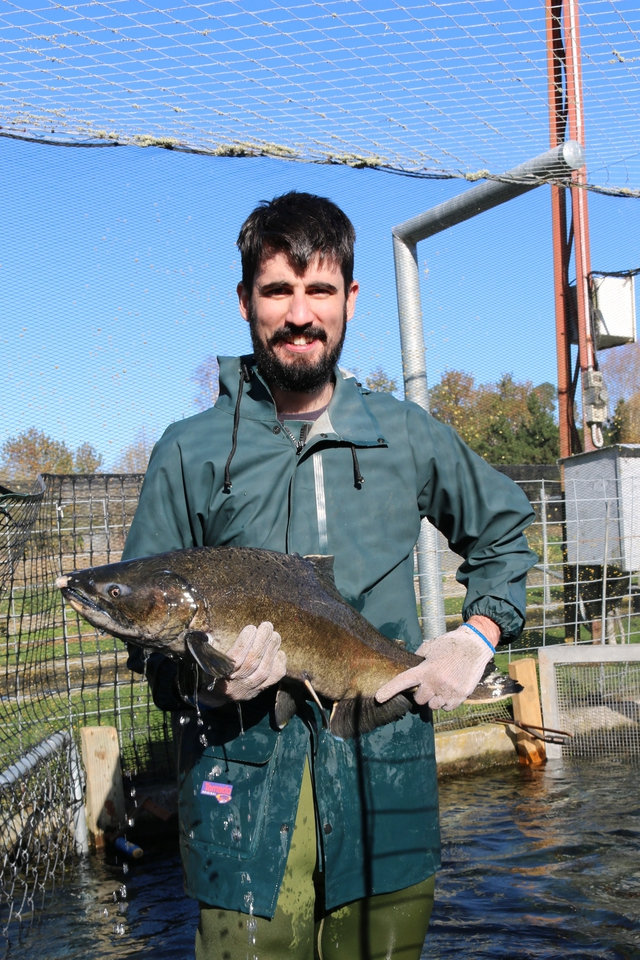Research
Published 10 November 2017Swim speed: Salmon study unlocks sexual secrets

Kiwi scientists have revealed how females in one species can influence which competing sperm make it to their eggs first - with possible implications for understanding our own reproduction system
Originally published in the NZ Herald on 24 October 2017
A New Zealand study has shown how male chinook salmon, also known as king salmon, can adjust their sperm's swimming speed if competing with a rival to reproduce.
The insights, by Canterbury and Otago researchers, could help us better understand male fertility in other species - including humans.
It's known that the males of many species fight to establish social dominance and control over access to females and the opportunity to reproduce.
In humans, this was quirkily signalled by one Australian study that found mixed-gender pornography stimulated male sperm faster than all-women porn.
In this case, University of Canterbury PhD student Michael Bartlett and his colleagues looked to chinook salmon to investigate the link between male social status, which influenced the competition for sperm, and the quality of their sperm, or how fast it could swim.
Using a series of innovative social manipulation experiments at Canterbury's Salmon Smolt NZ hatchery, the researchers were able to show, for the first time, exactly how this manipulation of ejaculate worked in response to social cues.
They revealed how males were able to change their sperm swimming speed, in less than 48 hours, if challenged by another male.
When males changed their sperm velocity, via semen or seminal fluid, this altered the number of eggs that they fertilised relative to a rival male, Bartlett said.
"In other words, the adjustment of sperm velocity altered male reproductive success and therefore fitness."
Specifically, the study showed "sub-dominant" males had faster-swimming sperm compared to dominant ones.
Seminal fluid from subdominant males increased the sperm swimming speed of sperm from dominant males, and conversely, the seminal fluid from dominant males slowed sperm swimming speed of the sperm from subdominant males.
The study involved a fascinating experiment where the researchers set up competitive in vitro fertilisation experiments at the hatchery to effectively "race" sperm between each set of paired males, using natural and remixed ejaculates.
They then genotyped the eggs to see which male sired the greater proportion of eggs, finding subdominant males fathered more of them.
The effect seminal fluid had on sperm function also affected a male's fertilisation success, as sperm incubated in the seminal fluid of subdominant males sired more eggs than sperm incubated in the seminal fluid of dominant males.
The discovery contributed to a better understanding of the reproductive biology of chinook salmon, a commercially important aquaculture species also highly sought after by sport fishers.
Improved knowledge of the effects that seminal fluid had on sperm function may also have important consequences for our wider understanding of male fertility, Bartlett said.
"This rapid change in sperm speed is caused by differences in seminal fluid, not the sperm themselves.
"At present, we still don't know what component of seminal fluid is involved.
"Taken together, our results provide novel insight into the evolution of male reproductive biology."
Study co-author Professor Neil Gemmell, of Otago University, said that how males were able to beef up their sperm production when challenged had been largely unknown.
"What we have discovered is that males tailor the seminal fluids of their ejaculates to rapidly optimise their reproductive approach based on their perception of competition for mating opportunities.
"Such competition is widespread in nature and thus our work has a wide bearing for many systems, including humans."
More knowledge about the effects of seminal fluid on sperm function and its effects on male reproductive performance and fitness could have important implications for our understanding of male fertility in humans, livestock, and aquaculture.
The research, to feature in international eLife, was undertaken as a component of a Marsden Fund grant held by his principal supervisor Dr Patrice Rosengrave, a research fellow in the Department of Anatomy, University of Otago and fellow of the University of Canterbury.
Dr Tammy Steeves, of the University of Canterbury's School of Biological Sciences, was also involved in the study.
The new paper followed an earlier study, also co-authored by Gemmell, that revealed how the ovarian fluid that female salmon released with their eggs could help or hinder sperm swiftness - depending on the male it came from.
Additional information: Listen to PhD student Michael Bartlett talk about this research on Newstalk ZB
Additional information: Read the original NZ Herald article here
RESEARCHER
Dr Patrice Rosengrave
ORGANISATION
University of Otago
FUNDING SUPPORT
Marsden Fund
CONTRACT OR PROJECT ID
UOO1209
